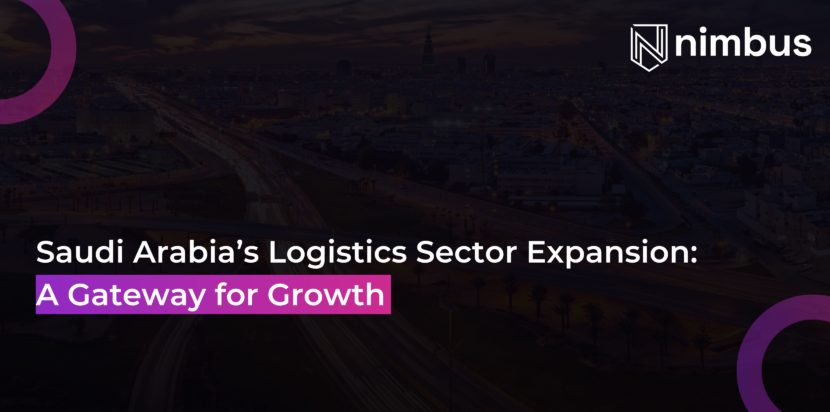Saudi Arabia is rapidly transforming its logistics sector into a global benchmark, positioning itself as a central hub for supply chains, trade, and transportation across three continents.
The Kingdom is not only modernizing infrastructure but also actively encouraging international partnerships, foreign investments, and technology-driven logistics solutions.
With the goal of constructing 59 logistics centers spanning over 100 million square meters by 2030, Saudi Arabia’s commitment to developing a world-class logistics ecosystem is clear. This transformation is already bearing fruit, as evidenced by the Kingdom’s rise in the World Bank’s Logistics Performance Index 2023, where it climbed 17 places to 38th globally.
This blog explores the driving factors behind Saudi Arabia’s logistics expansion, key investment projects, and the growing opportunities for investors looking for company formation in Saudi Arabia global in this sector.
OVERVIEW OF SAUDI ARABIA’S LOGISTICS SECTOR EXPANSION

1. Policy Support Under Vision 2030
The logistics sector is central to Saudi Arabia’s economic diversification efforts. Under the National Transport and Logistics Strategy (NTLS), the government aims to increase the sector’s contribution to the national GDP from 6 percent to 10 percent by 2030.
To achieve this, Saudi Arabia is focused on integrating itself into global supply chains through strategic investment in infrastructure and policy reforms.
Major economic zones such as the King Abdullah Economic City (KAEC) and the Riyadh Integrated Special Economic Zone are designed specifically to attract foreign investment and offer specialized services for logistics companies.
These zones provide regulatory incentives, streamlined customs processes, and dedicated infrastructure, making them highly attractive for international players. Government programs like the Global Supply Chain Resilience Initiative and the National Industrial Development and Logistics Program (NIDLP) are also strengthening the sector’s growth by enhancing trade connectivity and resilience.
2. Rising Investments
Saudi Arabia’s logistics transformation is fueled by significant investments from both public and private sectors. Industry reports show that private sector investments in port logistics zones have now exceeded SAR 10 billion (approximately USD 2.7 billion), covering an operational area of six million square meters. Notable developments include:
- Maersk’s SAR 1.3 billion investment in Jeddah Islamic Port, enhancing its capacity and efficiency.
- Arcapita’s launch of a SAR 1.8 billion logistics fund aimed at developing modern logistics centers.
- The Saudi Ports Authority (Mawani) allocating USD 4.5 billion towards upgrading maritime, port, and logistics infrastructure, including the creation of five new logistics parks valued at over SAR 4 billion.
In addition to port expansions, new logistics centers are being developed across Riyadh, Makkah, and the Eastern Province, creating more space and connectivity for businesses.
These efforts are complemented by events such as the Saudi Warehousing and Logistics Expo, which recently showcased over 3,500 logistics products and services. Such platforms demonstrate the sector’s momentum and the growing interest from international businesses and investors.
3. Growth in Commercial Activity and Business Licensing
The impact of logistics reform is evident in the surge of commercial activity within the sector. In Q2 2024 alone, the logistics sector recorded the highest growth among all non-oil sectors, including a 76 percent increase in active commercial registrations compared to the previous year.
With nearly 12,000 commercial licenses issued in one quarter, the Kingdom’s logistics industry continues to attract foreign companies seeking a foothold in a rapidly growing market.
One example is the UK-based Unipart Group, a global logistics and consultancy firm, which recently expanded into Saudi Arabia. The company cited Saudi Arabia’s geographic advantage and infrastructure development as key drivers for its move.
4. E-commerce as a Catalyst for Logistics Expansion
E-commerce is playing a transformative role in shaping Saudi Arabia’s logistics landscape. As online shopping becomes more mainstream, the demand for advanced logistics and last-mile delivery solutions is growing rapidly.
Between 2019 and 2024, the number of e-commerce users in Saudi Arabia increased by 42 percent. Projections indicate that the number will reach 34.5 million users by 2025, and e-commerce revenue is expected to double to USD 22.68 billion by 2027.
This surge is prompting major investments in warehouse automation, fleet management, and smart delivery solutions. The logistics sector’s contribution to GDP is expected to increase to 12 percent by 2025, reflecting its growing importance in the national economy.
These developments are attracting technology companies that specialize in digital logistics solutions such as AI-based fleet optimization, blockchain for cargo tracking, and IoT-enabled warehouse management. Businesses that provide integrated logistics technologies have a unique opportunity to support Saudi Arabia’s e-commerce infrastructure.
5. Strategic Collaborations
Saudi Arabia is actively encouraging international collaborations to drive innovation and best practices in logistics. One notable partnership is the joint venture between France’s Marseille and Saudi Arabia’s Almajdouie Logistics, aimed at enhancing e-commerce logistics services.
The JV plans to create a fleet of over 2,000 assets and generate more than 2,000 jobs for Saudi nationals, supporting workforce localization goals while introducing global logistics standards to the local market.
Such partnerships are crucial to improving operational efficiency and boosting the Kingdom’s competitiveness in international trade. They also align with the Vision 2030 goal of achieving carbon neutrality by 2060 through the integration of sustainable logistics solutions.
6. Why Global Companies Should Invest Now?
With more than USD 150 billion earmarked for the logistics sector, Saudi Arabia’s ambitions are clear. The convergence of modern infrastructure, robust government support, and increasing trade volumes makes it a strategic base for companies involved in transportation, supply chain management, and e-commerce fulfillment.
As the country prepares to host global events like Expo 2030 and the FIFA World Cup 2034, demand for seamless logistics will only intensify. This provides an exceptional window for international businesses to invest, scale, and collaborate in a region positioned for exponential growth.
The Road Ahead
Saudi Arabia’s logistics sector is no longer a support function, but has grown into a central pillar of the national economy. From special economic zones and global partnerships to robust infrastructure, the Kingdom is creating a logistics ecosystem that meets global standards and invites international participation.
For investors looking for expansion, Saudi Arabia offers a unique mix of scale, ambition, and opportunity. With the logistics sector acting as a key enabler of trade, investment, and innovation, now is the time for business be part of the Kingdom’s journey toward becoming a world-class logistics powerhouse.



